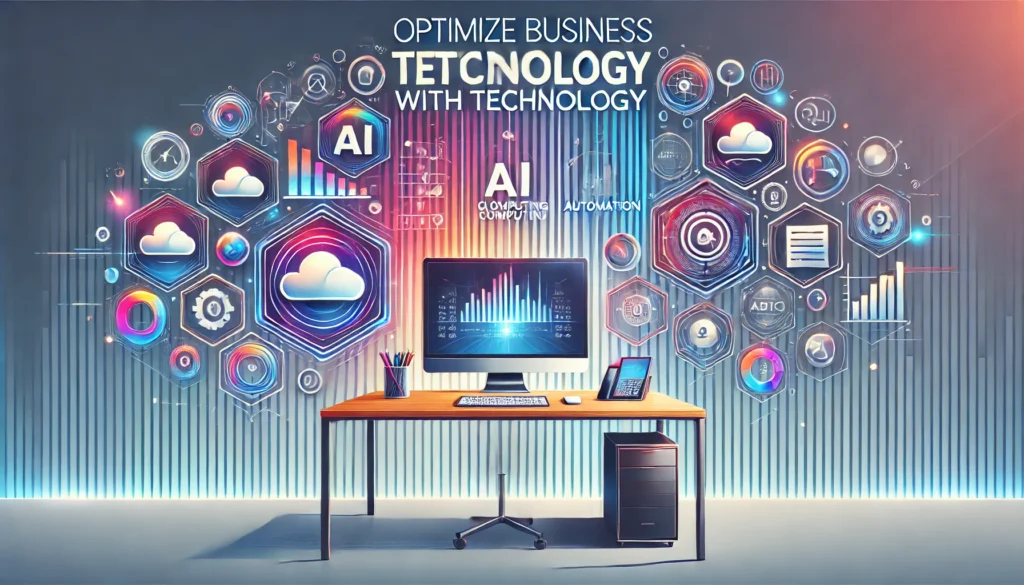Introduction
the digital age has fundamentally transformed the way businesses management, and technology has become a key driver of success. Today, technology isn’t just a supportive tool—it’s an integral part of business management, streamlining operations, enhancing efficiency, and providing actionable insights. Whether you’re a startup or a large corporation, integrating technology into your management strategy is essential to stay competitive. So, how exactly does technology optimize business management? Let’s dive in.
Understanding Business Management
What is Business Management?
Business management involves the coordination of various activities and resources—such as people, finances, and operations—to achieve organizational goals. It includes planning, decision-making, organizing, leading, and controlling. Effective management ensures that a company runs smoothly, meets its objectives, and stays profitable.
Common Challenges in Business Management
Before diving into how technology can help, it’s crucial to understand the common hurdles businesses face. These challenges include inefficient processes, lack of real-time data, poor communication, and difficulty in tracking performance. Without the right tools, businesses can find it hard to adapt to market changes, make data-driven decisions, or keep employees aligned with company goals.
How Technology is Transforming Business Operations
The Rise of Digital Tools in Business
In the past decade, digital tools have taken center stage in business operations. From project management software to sophisticated customer relationship management (CRM) systems, businesses now have access to a range of technologies that can streamline processes and improve overall efficiency.
Automating Repetitive Tasks
One of the key benefits of technology is automation. By automating repetitive tasks—such as invoicing, data entry, and email responses—businesses free up time for employees to focus on more strategic work. This not only boosts productivity but also reduces the risk of human error.
Key Technologies Revolutionizing Business Management
Cloud Computing and Data Storage
Cloud computing has revolutionized how businesses store and access data. By shifting from traditional in-house servers to cloud platforms, businesses can store vast amounts of data securely, access information in real-time, and scale resources as needed. Cloud computing also enables businesses to support remote work and improve collaboration across teams.
Artificial Intelligence (AI) in Decision Making
AI is no longer a futuristic concept—it’s here, and it’s transforming how decisions are made. AI-powered tools analyze large datasets and generate insights that help business leaders make informed, data-driven decisions. Whether it’s optimizing supply chains or predicting consumer behavior, AI is proving invaluable in business management.
Customer Relationship Management (CRM) Systems
CRM systems are designed to improve customer interactions and boost sales. By centralizing customer data, CRMs allow businesses to track sales leads, manage customer interactions, and automate marketing efforts, all in one place. This leads to improved customer satisfaction and a more personalized customer experience.
The Role of Enterprise Resource Planning (ERP) Systems

Integrating Business Functions
Enterprise Resource Planning (ERP) systems integrate various business functions—such as accounting, human resources, and inventory management—into a single platform. This integration ensures that departments work cohesively, with real-time data accessible across the organization, making processes more efficient and communication smoother.
Real-Time Data and Reporting
With ERP systems, business leaders can access real-time reports on the company’s performance, financials, and operations. This enables faster and more accurate decision-making, improving the ability to respond to market changes or internal challenges.
The Power of Automation
Streamlining Workflow with Automation
Automation allows businesses to streamline workflows and ensure that tasks are completed consistently and on time. From setting up automated workflows in project management tools to scheduling social media posts, automation helps businesses work smarter, not harder.
Reducing Human Error through Automation
Human errors can be costly, especially when it comes to financial reporting or inventory management. By automating these processes, businesses can significantly reduce the risk of mistakes, ensuring more accurate outcomes and improving overall reliability.
Improving Communication and Collaboration
Virtual Communication Tools
In a world where remote work is becoming the norm, tools like Zoom, Slack, and Microsoft Teams have become essential for keeping teams connected. These platforms provide a space for virtual meetings, file sharing, and instant messaging, making it easier for employees to collaborate, regardless of location.
Collaborative Project Management Platforms
Project management tools such as Trello, Asana, and Monday.com enable teams to collaborate more effectively. These platforms allow businesses to assign tasks, track progress, set deadlines, and share updates in real-time, ensuring everyone is on the same page and projects stay on track.
Data-Driven Decision Making
The Importance of Big Data and Analytics
Data is the backbone of modern business decision-making. Companies collect vast amounts of data every day, and with the right tools, they can turn this data into valuable insights. Big data analytics helps businesses understand customer behavior, identify trends, and optimize performance.
Predictive Analytics in Forecasting and Planning
Predictive analytics uses historical data and machine learning algorithms to forecast future outcomes. Businesses use predictive analytics to plan inventory, forecast sales, and even anticipate market trends, giving them a competitive advantage.
Cloud-Based Solutions: Enhancing Flexibility and Accessibility
Benefits of Cloud Solutions for Remote Work
Cloud-based solutions enable employees to access company data and applications from anywhere, making remote work seamless. This flexibility boosts productivity and employee satisfaction, as workers can collaborate and contribute from anywhere in the world.
Cost-Effectiveness of Cloud Platforms
Cloud solutions eliminate the need for expensive on-site servers and IT infrastructure. With cloud platforms, businesses only pay for the resources they use, making it a cost-effective option for businesses of all sizes.
Artificial Intelligence and Machine Learning in Business
Enhancing Efficiency with AI-Powered Tools
AI-powered tools are enhancing business efficiency in areas like customer service, supply chain management, and marketing. From chatbots that handle customer queries to AI algorithms that optimize logistics, AI is enabling businesses to operate more efficiently.
Predicting Market Trends Using Machine Learning
Machine learning algorithms analyze data to identify patterns and predict future trends. This helps businesses stay ahead of the competition by anticipating changes in consumer behavior, market conditions, and industry disruptions.
Mobile Technology in Business Management
Managing Business On-the-Go
Mobile technology allows business managers to stay connected to their operations, even while on the move. Mobile apps for project management, CRM, and financial tracking enable leaders to monitor progress and make decisions in real-time, no matter where they are.
The Rise of Mobile Apps for Business Operations
Many businesses now rely on mobile apps to handle everything from inventory management to customer engagement. These apps provide a convenient way to manage tasks on the go, making business operations more flexible and responsive.
Cybersecurity: Protecting Business Data
The Growing Importance of Cybersecurity
As businesses increasingly rely on technology, cybersecurity has become a top priority. Protecting sensitive data from cyber threats is critical, especially as cyberattacks grow more sophisticated.
Best Practices for Securing Business Data
Businesses must adopt best practices for securing their data, including using encryption, two-factor authentication, and regular security audits. Keeping systems up to date and training employees on cybersecurity protocols is also essential.
Sustainability and Technology in Business
Using Technology to Reduce Environmental Impact
Technology is also playing a role in helping businesses reduce their environmental impact. From energy-efficient data centers to tools that help monitor and reduce carbon footprints, businesses can leverage tech to support
sustainability initiatives.
Green Tech Solutions for Sustainable Business Practices
Green technology solutions, such as renewable energy sources and eco-friendly supply chain management tools, are helping businesses reduce waste, lower emissions, and create more sustainable business models.
Future Trends in Business Management Technology
The Evolution of Blockchain in Business
Blockchain technology is set to transform industries by providing secure, transparent, and decentralized ways to manage transactions. From supply chain management to smart contracts, blockchain has the potential to revolutionize business operations.
How Quantum Computing Could Change Business Management
Though still in its infancy, quantum computing promises to solve complex problems that are currently beyond the capabilities of traditional computers. As this technology matures, it could have a massive impact on industries like finance, logistics, and healthcare.
Conclusion
Technology is no longer just a tool; it’s the backbone of modern business management. From automating repetitive tasks to improving decision-making with AI, technology offers endless possibilities for businesses to streamline operations, improve efficiency, and stay competitive. Embracing these technologies will not only optimize your business but also position you for long-term success.
FAQs
What are the most impactful technologies for small businesses?
Cloud computing, CRM systems, and automation tools are highly beneficial for small businesses looking to optimize operations.
How can AI help businesses improve customer experience?
AI can personalize customer interactions, offer real-time assistance through chatbots, and predict customer needs, leading to a better overall experience.
What is the role of cloud computing in business management?
Cloud computing enables flexible data access, supports remote work, and reduces the need for expensive IT infrastructure.
Are automation tools necessary for small businesses?
Yes, automation tools can help small businesses save time, reduce errors, and focus on growth-oriented tasks.
How can businesses ensure data security while using technology?
By implementing strong cybersecurity measures like encryption, two-factor authentication, and regular security updates, businesses can protect their data from cyber threats.









Leave a Reply